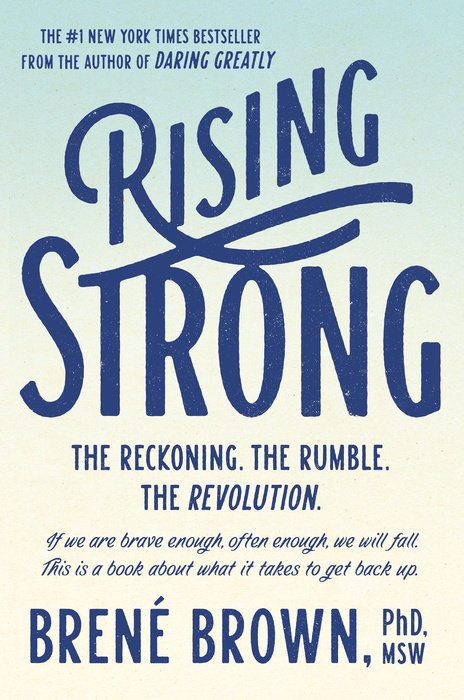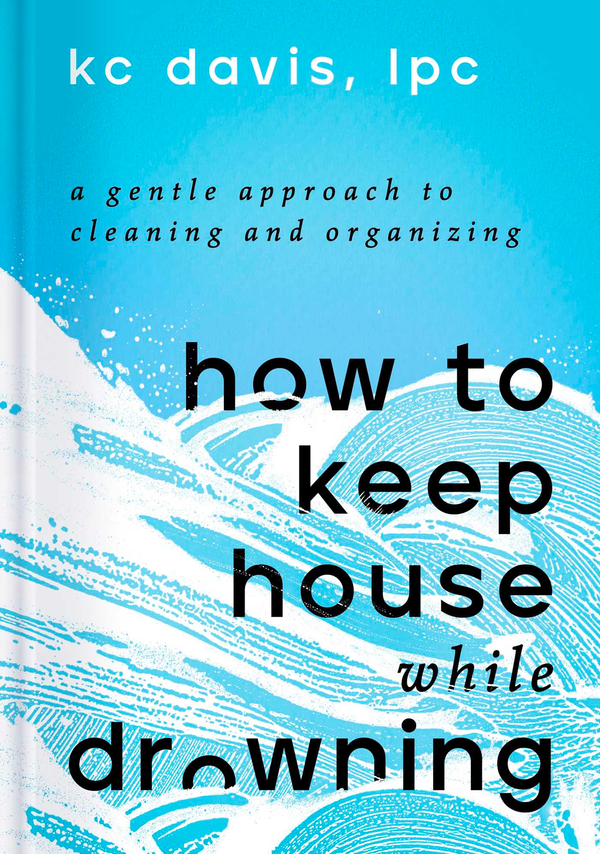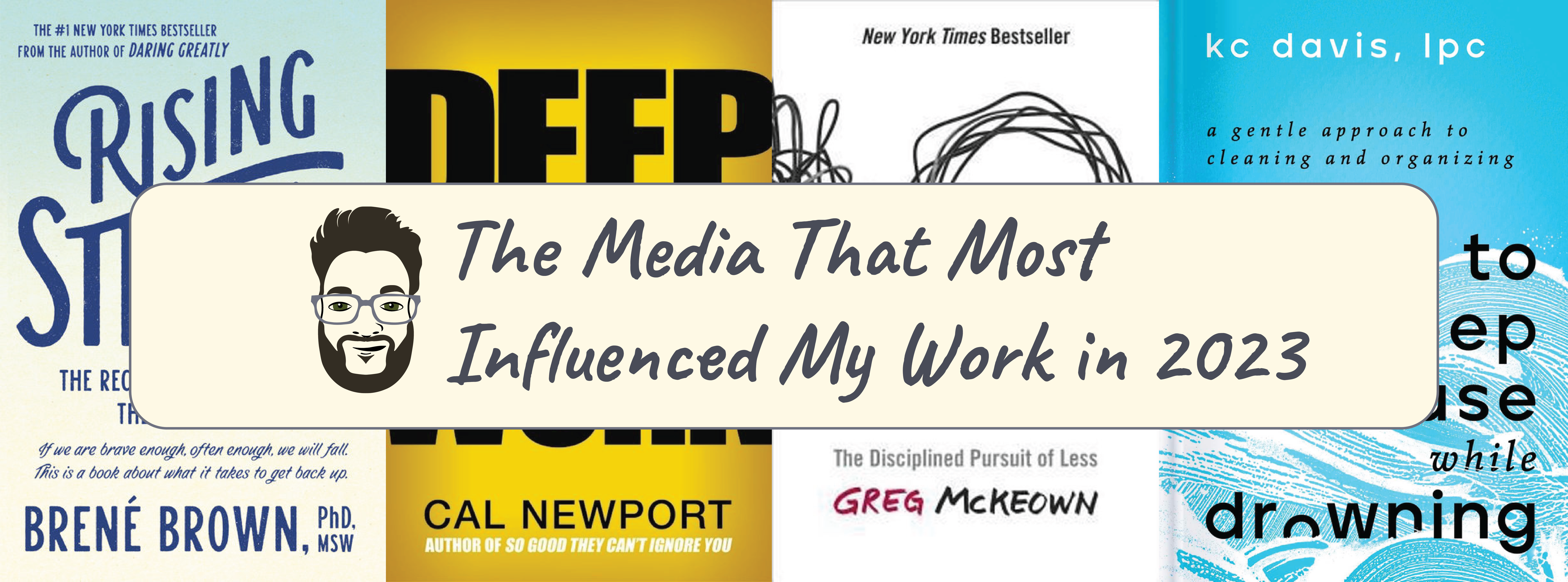I love a good story. Everyone does, but I’ve sort of set up my life around my love of stories. My favorite stories are the ones I find myself wrestling with months and years later.
For instance, I can’t figure out if 2012’s The Paperboy (starring David Oyelowo, Matthew McConaughey, Zac Efron, and Nicole Kidman) is a good movie, but I’ve thought about it so much that it doesn’t matter.
These are the books that I’ve found myself thinking about on my walks and in waiting rooms this year. These are the books that show up again and again in my notebook.
Rising Strong/Daring Greatly


What Brené taught me: Shame is a storytelling issue, and I have to tell myself a better story if I expect things to change. That starts with a painful, vulnerable shitty first draft. But that’s where everyone starts, and the more of us willing to share that draft (intentionally and with boundaries), the better the world will be.
Brené Brown is quickly becoming an all-time writing legend for me. Her books resonate with my mental and social life in the way Rachel Held Evans could stimulate spiritual and emotional selves.
I never read two Brené Brown books in the same year because don’t want to run out. Plus, each book leaves me with a year’s worth of stuff to think about.
This year I broke my rule.
Rising Strong and Daring Greatly add to her larger body of work about shame and vulnerability. Basically, shame festers and can ruin your relationships, your work, and your health. But vulnerability, when practiced with intention and boundaries, can be akin to preventive medicine. It’s uncomfortable, but it will benefit you greatly.
I read these books while trying to start my business full-time. I was balancing investing in my own dream, career, and passion while supporting my wife in her doctoral program. I want to be a storyteller and teacher of some renown. She wants to increase the health of babies and birthing parents in a world (and specifically a state) that are trying to use women’s health for political control.
Her path is obviously more important, though storytelling and entrepreneurship are going to be big-time assets when she graduates.
In fact, a lot of problems with the modern-day approach to health and women’s health is rooted in shame—rooted in telling ourselves the wrong stories.
In much of Brené’s research, storytelling is at the root of shame.
The stories we tell about our lives and pasts influence how we process and respond to the future.
How to Keep House While Drowning

What K.C. taught me: I should strive for good mental health and functionality over societal norms, in my home, at work, and in the way I raise my kids.
This book is K.C. Davis’ collection of practical advice on how to keep a functional house. But it’s really a book about mental health and the imaginary expectations we put on ourselves.
Davis makes the argument that care tasks aren’t good or bad.
“You are not a failure because you can’t keep up with laundry. Laundry is morally neutral,” she says.
Then, drawing on some of Brené’s shame research, K.C. argues that even if laundry held moral weight, feeling shame about doing your laundry will not remedy the situation. Instead of worrying about how to clean your house, figure out how to make your house the most functional for you.
For instance, she knows her family is going to throw clothes on the floor, no matter how hard they try not to. So she puts a laundry basket in every room. Weird? Maybe. Does it work for her? She says it does and that’s all we have to go on.
The best part, she doesn’t care if you do things her way or not. She encourages you to find the happy medium between effort, functionality, and reality.
The same is true of email, social media, project management, and month-to-month workload.
Deep Work

What Cal taught me: Cal helped me connect K.C.’s research to the way I operate my business and structure my schedule.
Do you ever do the thing where you ignore a book because it’s trendy? I do.
That’s one of the reasons I didn’t read Deep Work sooner. Also, I wasn’t in a position where I felt safe to take ownership of my own workday and notifications.
Restrict your availability for deeper work? Do less work but make it better? Yeah, right.
But then I lived through a lot of the things Cal Newport warns against. I overloaded, took on too much, and covered for others—until I burnt out and others were covering for me.
No one benefited. I mean, a few people made a little money, but no one came away healthier.
I don’t think Cal’s writing will benefit everyone, and it could even stress someone like former me out. But if you’re trying to figure out why you’re working harder than you’ve ever worked but not moving the needle, this might be a good read.
Essentialism: The Disciplined Pursuit of Less

What Greg taught me: I’m not going to be a rockstar, influencer, entrepreneur, author, professor. But, in pursuit of storytelling and educating, I can use each of those desires and skillsets as it becomes relevant to make my body of work stronger.
When I help a company build a brand strategy, I often find myself warning against scope creep. Company leaders will often turn their mission, vision, and values statements into bulleted lists for fear of missing out on revenue streams or messaging opportunities.
This is called scope creep. It can happen in two ways.
- Internal Scope Creep sets too many unconnected goals without the ability to prioritize them. The equally weighted pursuit of too many goals leads to the completion of none.
- External Scope Creep can’t winnow its message for fear of missing out on opportunities. This happens when brands feel the need to distribute too many unrelated messages, leaving the consumer confused or unaware.
Greg McKeown pulls from Cal Newport, taking the argument one step forward beyond the quantity and quality of projects to the quality of your body of work.
(You may have noticed by now that each of these entries has influenced the next. I did not approach these books, knowing they would all bring me to a similar place.)
For instance, I felt a great deal of shame about my inability to create and maintain a social media strategy for my own business when I do it for other businesses. But social media isn’t the point. I hate the day-to-day of social media.
So I wrote down my essentials:
- Storytelling
- Educating
As I built my business strategy around these two pillars, I realized one of the best tools to achieve them is social media. So I built a plan that will help me accomplish my storytelling and teaching goals. Now, I pursue those goals, and the social media part is simply the result.
When I let my passion drive, social media just happens to be the exhaust.
And I’ve found the result of social media is a richer connection to the world around me. I’ve met people, learned from people, and reconnected with old colleagues and friends (to do new projects!).
In the spirit of connecting, tell me your favorite thing:
What pieces of media influenced you the most this year? Shoot me an email and let me know.

